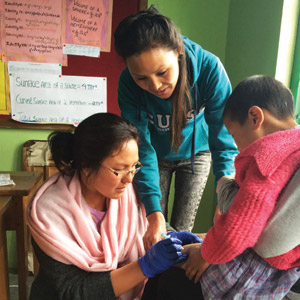Vaccinating Children in Northeast India
For her capstone project, Marina Furtado, MPH 2014 Health Services, set up an immunization program at a remote orphanage in the foothills of the Himalayas in northeast India. Many of the Jhamtse Gatsal school's 90 children were not immunized. Marina traveled far and wide to find vaccines, and went door-to-door in nearby towns to find a refrigerator to keep them cold. An emergency room physician, she also provided medical care—one day resuscitating an 8-year-old boy who nearly died from eating poison berries.

Training the Trainers in Beijing
In Beijing, Abigail Halperin, director of the Tobacco Studies Program, and research assistant Nick Fradkin trained smoking cessation counselors and public health program managers to provide increased access to treatment for tobacco dependence. Halperin and Fradkin were part of a six-person team from the International Quitline Institute (IQI) that conducted a training program developed with the World Health Organization. Forty-five trainees from 15 Chinese provinces took part in the event, co-hosted by the China CDC. About half the group will put their newfound skills to work as counselors for China's public health hotline, while the other half will apply their learnings in other agencies working to decrease tobacco use in their communities. Halperin co-founded the IQI in 2010.
Strengthening Regional Food Supplies
Four nutrition grad students spent a summer investigating and then reporting on the way Washington state produces processes, distributes, and consumes food: Jamie Bachaus, Katherine Getts, Jessica Jew, and Kidan Araya (Geography).
They interviewed stakeholders, conducted a literature review, and facilitated breakout meetings with members of the Washington State Food Systems Roundtable. The Roundtable is an interagency work group hoping to generate a 25-year vision to strengthen regional food supplies and increase access to healthy foods. The students were mentored by Health Services faculty member Jennifer Otten, a member of the Roundtable. The students co-authored a report and presented their findings in Wenatchee last fall.
New Domestic Programs for START
The Strategic Analysis, Research & Training Program (START) has expanded to become a center in the department of Global Health and to provide research and analysis to domestic-focused agencies. One of the first domestic projects was based on a request from King County, which sought research as it prepares to ask voters to fund more early childhood programs. Graduate student and research assistant Anne Althauser studied other prevention-type initiatives across the country to assess factors that led to their successful passage. START began in 2011 as a faculty and student effort to provide analysis to the Bill & Melinda Gates Foundation. More than two dozen graduate students have completed more than 75 different projects on global issues from TB and pneumonia to the scale-up of oral rehydration salts.
